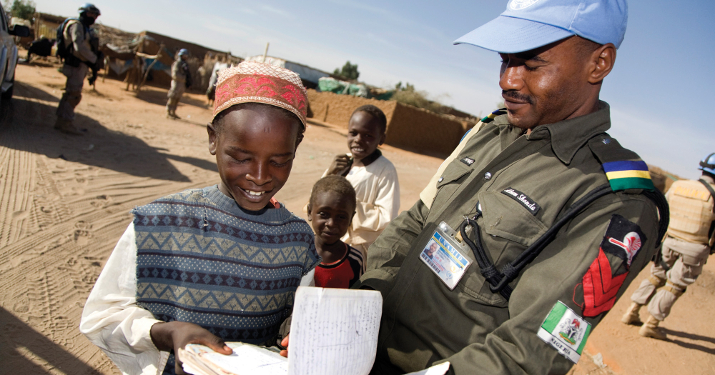
Africa more peaceful than ever
In the nineties, much of the continent was ravaged by war, but things have changed. Armed conflict is now a smaller risk to most Africans than traffic accidents.
Share
Other categories
Region: Africa
Theme: Peace & security
Twenty years ago, the geopolitical analyst Robert D. Kaplan was convinced that Africa would soon descend into total chaos. In a 36 pages long article in the American magazine The Atlantic Monthly, Kaplan predicted the imminent collapse of the African states. He believed the continent would turn into a war-torn hell, barely in contact with the rest of the world through a few extremely violent coastal cities.
But as it turned out, Kaplan’s dystopian vision was proven wrong. While there are still several ongoing conflicts in Africa, many of the wars of the nineties have since ended. Rather than marking the beginning of a new, violent trend, it now seems that decade was an unusually unstable period in African history, and that this era came to an end around the turn of the century. Today, the continent seems more peaceful than ever, at least when looking at the overall picture.
This is one of the conclusions in a recent analysis, “The Decline of Warfare in Africa”, published in the scientific journal Contemporary Security Policy. The authors are two researchers of security and international relations: David T. Burbach from Naval War College, and Christopher J. Fettweis from Tulane University. Their analysis compares statistics on war and conflict in Africa since 1961. Using various datasets, the researchers looked for conflict trends, taking into account both the amount of ongoing wars and their military and civilian death toll.
Historic decrease in casualties
Burbach and Fettweis conclude that global warfare levels peaked around 1988, and that the world has gradually become more peaceful ever since, despite several setbacks. Initially going against this trend, the wars in Africa continued and intensified until approximately 2001, then conflict on the African continent also started to decline.
While Africa has become more peaceful, the population of the continent has been steadily growing. This combination of less warfare and more people means that war now poses a much smaller risk to most Africans than ever before. Even in DR Congo, where civil war is still active, the statistical risk of being killed in armed conflict is smaller than dying in a traffic accident.
“The continent is far from uniformly peaceful, and current outbreaks of violence are reminders of the need for more progress. On the whole, however, Africa is less war-torn than at any time in the past, which runs contrary to widespread perceptions that exist even among foreign policy experts,” according to Burbach and Fettweis.
Cold war after-effects
But how could it be that many countries in Africa went from war to relative peace quite suddenly? The two researchers do not give any definitive answer to this, but point to several factors.
Especially the cold war was a major reason why the nineties were so violent in Africa. As the two superpowers played out their global rivalries on African soil, they actively supported rival militias and corrupt governments. This led to increasing tension and conflict throughout the seventies and eighties. When the cold war ended as the Soviet Union suddenly collapsed in 1991, deliveries of weapons and money for the warring factions soon stopped. In the short term, this led to power balances shifting rapidly between groups, and this sudden shift has probably been a major reason why the African civil wars suddenly flared up during the nineties, according to the analysis. But many of these conflicts have now gradually come to an end, since there is no longer as much foreign involvement fanning the flames.
Peace efforts pay off
Burbach and Fettweis also credit the international community’s role in promote peace, both through peacekeeping missions and development aid. Increased stability leads to more industry and employment, fuelled by foreign investment as international trade grows. More wealth leads to optimism and thus increased stability, and can start a positive cycle, according to the two researchers. They warn that this progress is by no means assured to continue, because it remains very dependent on both continued global economic growth and on the continued efforts of the United Nations to create and maintain peace and security in areas of conflict.
Another risk to peace is possible rivalry between USA and China, which might also contribute to new conflicts in the future.
Despite these risks, the authors of the report conclude their analysis on a brighter note. While conflict still haunts some countries in Africa, we should not let this overshadow the recent development and progress of that enormous continent:
“For the first time in quite some time, there is reason for optimism about the decline of warfare in Africa. What the United States and other outsiders should not do, however, is continue to look at Africa though a lens that overemphasizes conflict and a few crisis-afflicted nations”.







